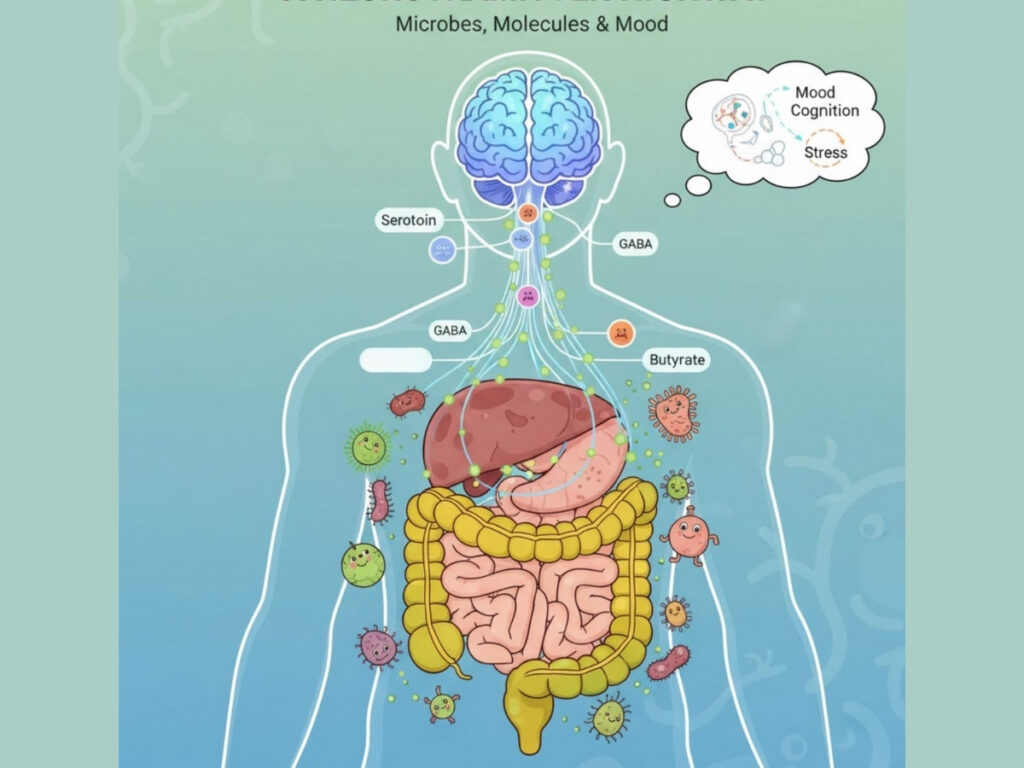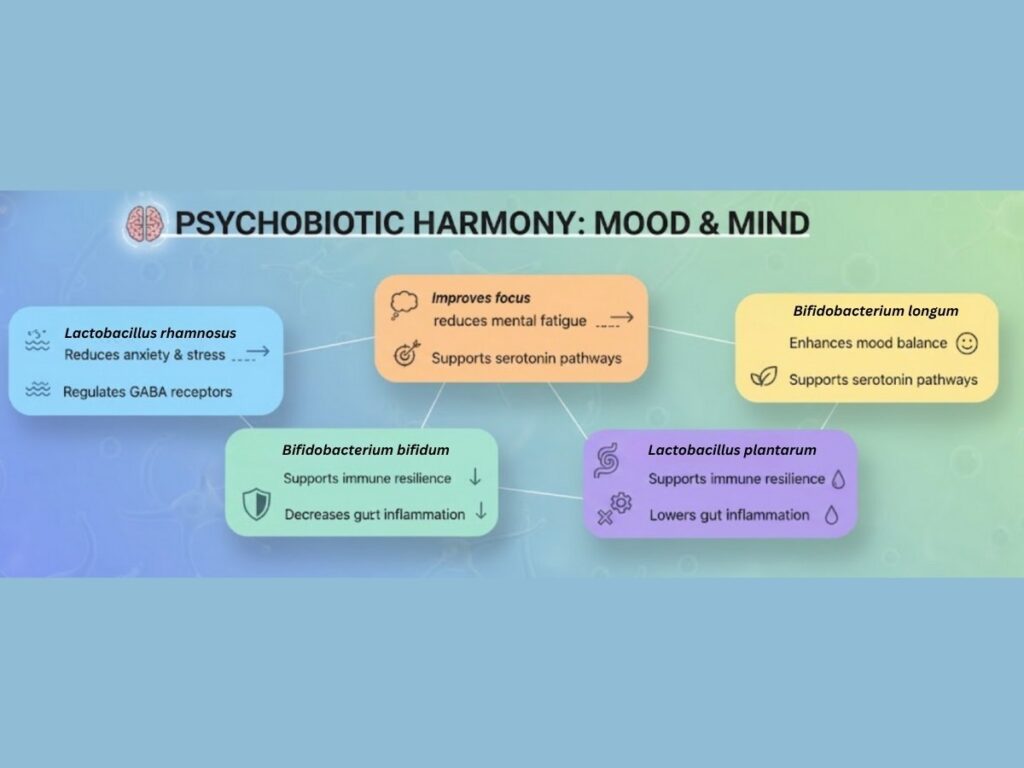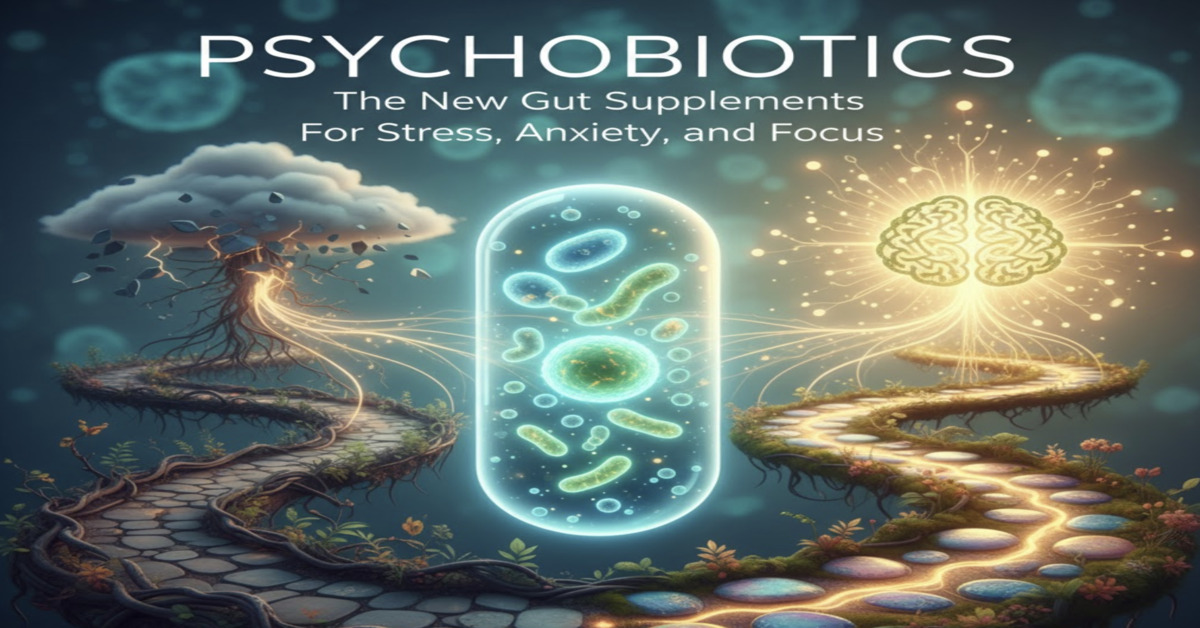Introduction: The Rise of Psychobiotics
Psychobiotics are the next generation of gut-health supplements, designed specifically to improve mental well-being, emotional balance, and cognitive performance. Unlike traditional probiotics that primarily target digestion, psychobiotics influence the gut-brain axis—helping regulate mood, stress response, and even focus.
Recent years have seen an explosion of interest in this field as Americans face record levels of anxiety, burnout, and cognitive fatigue. In 2025, psychobiotics are no longer a fringe concept—they’re becoming a foundational pillar in holistic wellness routines.

Understanding the Gut-Brain Axis
The gut-brain axis is a two-way communication network linking the digestive system and the brain through neural, hormonal, and immune pathways. Roughly 90% of serotonin—a key neurotransmitter for happiness and calm—is produced in the gut, not the brain.
Disruption in gut microbiota can trigger inflammation, stress hormone imbalance, and mood instability. Psychobiotics aim to restore harmony by supporting healthy bacteria that communicate positively with the brain.
Statistic: A 2024 NIH meta-analysis found that individuals taking psychobiotic strains experienced 32% lower stress levels and improved cognitive performance after 8 weeks.
The Science Behind Psychobiotics
Psychobiotics are specific bacterial strains that produce neurotransmitters (like GABA, serotonin, and dopamine) or influence their pathways. These effects are mediated through the vagus nerve and immune modulation.
Key mechanisms include:
- Serotonin synthesis: Enhanced by Lactobacillus strains.
- Cortisol regulation: Reduced stress response and improved sleep.
- Neuroinflammation control: Balanced cytokine activity supports mental clarity.
Expert Quote:
“Psychobiotics represent one of the most exciting frontiers in mental wellness—bridging gut science and brain health like never before,”
says Dr. Anna Robbins, PhD, Neuroscientist at Harvard Gut-Brain Institute.
Benefits of Psychobiotics for Mental Health
- Reduced Stress & Anxiety:
Regular use of psychobiotics lowers cortisol levels, leading to calmer emotional states. - Enhanced Focus & Cognitive Clarity:
Certain strains, like Bifidobacterium longum, support better memory and sustained attention. - Improved Mood & Emotional Stability:
Psychobiotics elevate serotonin availability, reducing symptoms of mild depression. - Better Sleep Quality:
By calming the nervous system, these supplements promote deeper, restorative sleep. - Reduced Gut Inflammation:
A healthier gut environment decreases systemic inflammation that often fuels anxiety.
Types of Psychobiotic Strains and Their Effects
| Strain | Primary Benefit | Mechanism |
|---|---|---|
| Lactobacillus rhamnosus | Reduces anxiety and stress | Regulates GABA receptors |
| Bifidobacterium longum | Improves focus and reduces mental fatigue | Supports serotonin pathways |
| Lactobacillus helveticus | Enhances mood balance | Decreases cortisol levels |
| Bifidobacterium bifidum | Supports immune resilience | Lowers gut inflammation |
| Lactobacillus plantarum | Boosts cognitive flexibility | Produces short-chain fatty acids |

How to Choose the Right Psychobiotic Supplement
- Look for clinically studied strains.
Ensure the label lists specific species (e.g., L. rhamnosus GG, not just “probiotic blend”). - Check CFU counts: Aim for 10–20 billion CFU per daily dose.
- Go for multi-strain formulas: They offer broader benefits for stress, sleep, and cognitive health.
- Opt for delayed-release capsules: Protect live bacteria through stomach acid.
- Pair with prebiotics: Compounds like inulin or GOS feed beneficial bacteria.
Psychobiotics vs. Traditional Probiotics
| Aspect | Psychobiotics | Traditional Probiotics |
|---|---|---|
| Target System | Gut-brain axis | Digestive tract |
| Key Benefit | Stress, focus, mood | Digestion, immunity |
| Strains Used | Lactobacillus, Bifidobacterium (specific strains) | General probiotic strains |
| Effects Timeline | 2–6 weeks for cognitive/mood impact | 1–3 weeks for digestive relief |
Actionable Daily Strategies for a Healthier Gut-Brain Connection
- Start your day with fermented foods:
Yogurt, kefir, sauerkraut, or kimchi boost microbial diversity. - Pair psychobiotics with prebiotic fiber:
Add oats, garlic, or bananas to your diet. - Manage stress naturally:
Meditation, cold exposure, or walking reduce cortisol spikes. - Stay hydrated:
Water helps bacterial metabolites circulate effectively. - Get consistent sleep:
Circadian rhythm influences gut microbiota balance.
Practical Checklist: Building Your Psychobiotic Routine
- Choose a trusted psychobiotic supplement
- Take it daily with meals
- Include prebiotic foods
- Limit processed foods and alcohol
- Track mood and focus improvements weekly
- Combine with mindfulness or yoga
Expert Insights on Psychobiotics
“The microbiome is the most underappreciated influencer of emotional resilience,” says Dr. Jacob Lin, Clinical Psychologist and Nutritional Psychiatry Researcher.
“Psychobiotics offer a safe, evidence-based alternative to help manage stress naturally—especially for those seeking holistic options.”
Common Myths & FAQ
Q1: Can I feel results immediately?
A: Most people notice mood or focus improvement within 2–4 weeks of consistent use.
Q2: Are psychobiotics safe with medication?
A: Generally yes, but always consult your physician if you take antidepressants or antianxiety drugs.
Q3: Can diet alone replace psychobiotics?
A: A high-fiber, fermented-food diet helps, but supplements offer precision dosing for consistent effects.
Q4: Are all probiotics psychobiotics?
A: No—only specific strains with neurological benefits qualify as psychobiotics.
Authoritative Resources
- Harvard Health Publishing – The Gut-Brain Connection
- NIH – Probiotics and Mental Health Research
- MDPI – The Role of Psychobiotics in Anxiety and Depression
Other Interesting Article
For readers interested in improving sleep naturally, explore our article:
Blue Light Insomnia: How Evening Screen Use Is Quietly Destroying Sleep Hormones
Conclusion & Call-to-Action
Psychobiotics are redefining how we think about mental wellness—proving that emotional resilience begins in the gut.
By supporting gut-brain communication, these supplements help reduce stress, improve focus, and promote emotional balance without dependency or side effects.
Next Step: Choose a clinically validated psychobiotic, nourish your gut with whole foods, and track your emotional improvements. Your brain health transformation can start today—one capsule and one mindful meal at a time.

